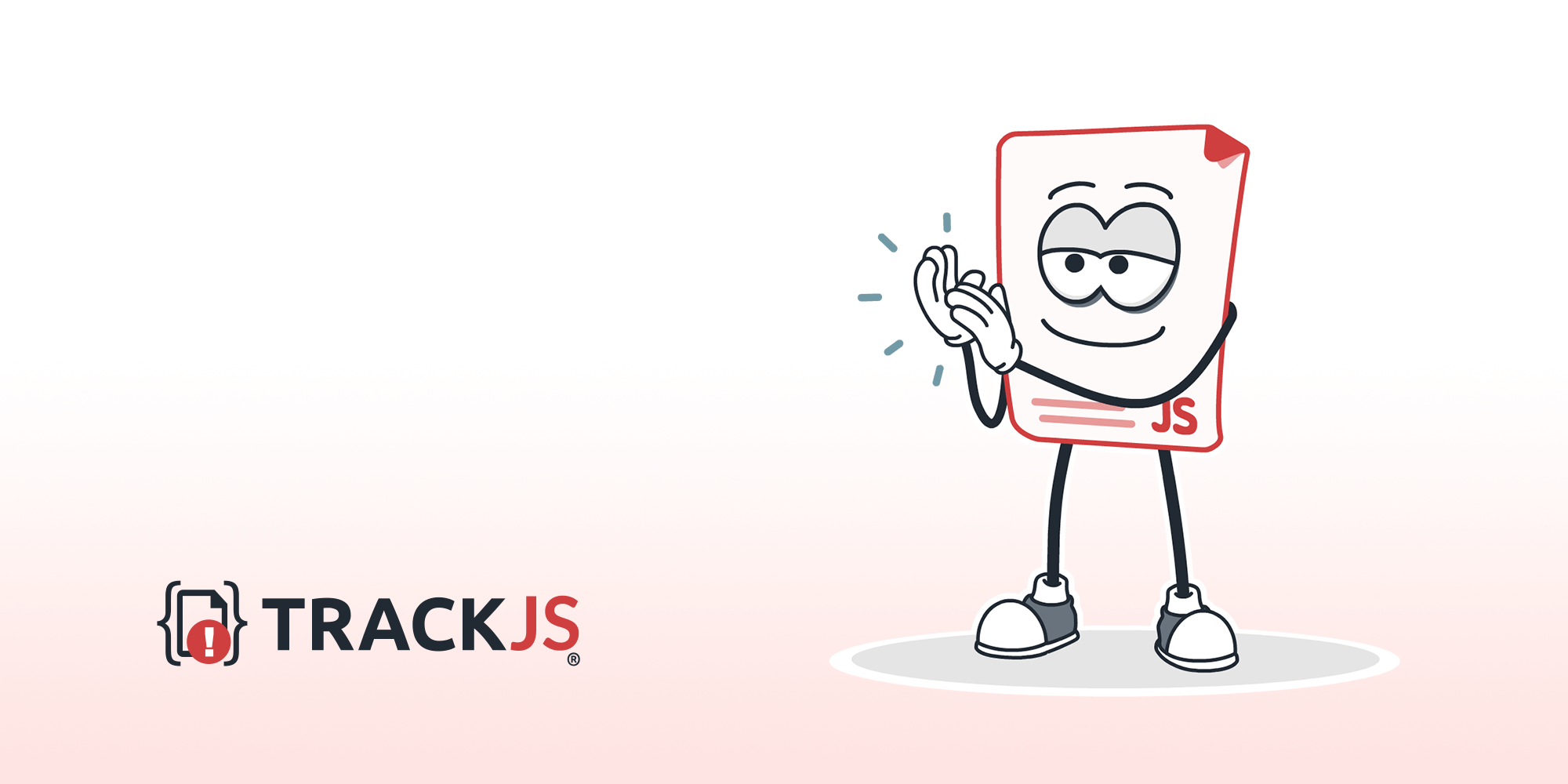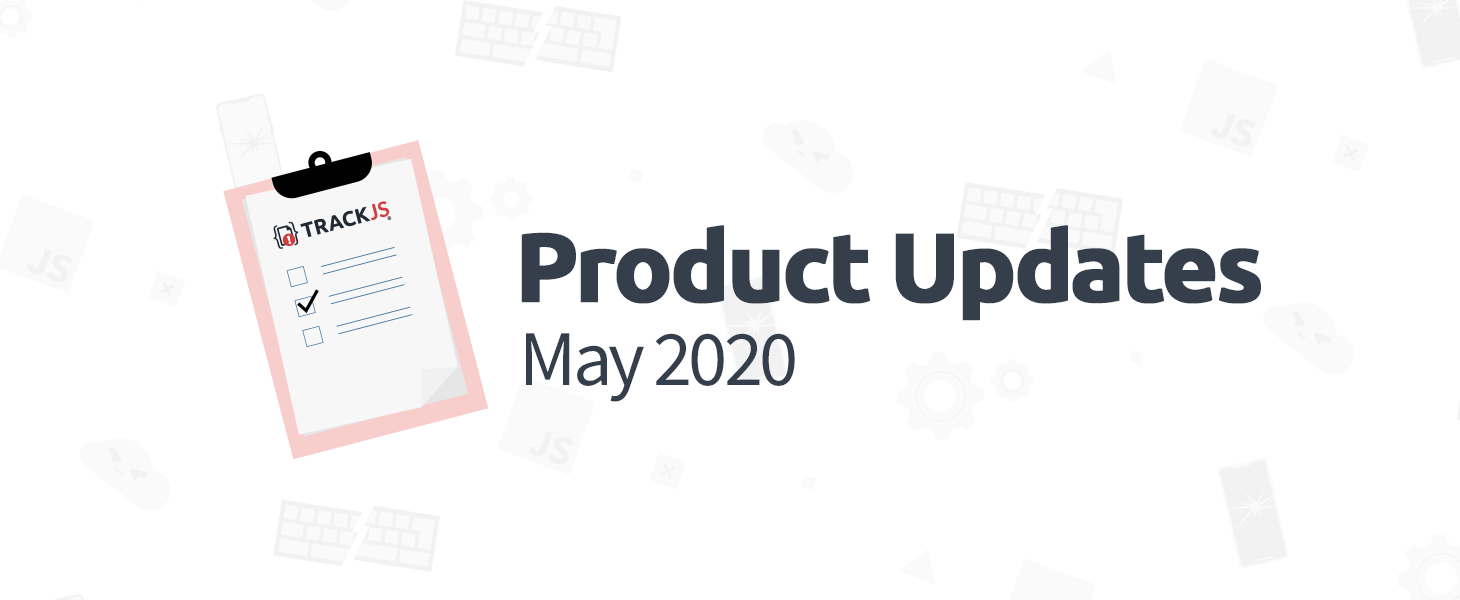The TrackJS Blog
Product Articles
-

A Fresh Look Without Moving the Cheese
After 12 years, TrackJS gets a modern UI refresh. Same reliable error tracking you know and love, just with a fresh look that doesn't move the cheese. Dark m... Read more »
-

Saved Filter Notifications
Alerts and notifications have been part of TrackJS since the very beginning. Our standard notification options reflect our desire to keep things simple. Ov... Read more »
-

Avoiding Ad Blockers with Forwarding Domains
Large tech companies are monetizing and exploiting customer data in increasingly unpalatable ways. It’s no surprise that users are fighting back. It’s estim... Read more »
-

Logging Errors in Web Workers
Release 3.8.0 of the TrackJS browser agent added support for Web Workers, which adds some awesome new observability to the background tasks of your web appli... Read more »
-

TrackJS for Node
TrackJS works in NodeJS environments! Read more »
-

May 2020 Product Updates
The TrackJS team is hard at work polishing the product to make it even better at tracking JavaScript Errors. Here’s what we shipped this Spring. Read more »
-
January 2020 Product Updates
The TrackJS team is hard at work polishing the product to make it even better at tracking JavaScript Errors. Here’s what we shipped in January. Read more »
-
A New Look for TrackJS
It’s a new year and TrackJS has a new look. It’s smaller, it’s simpler, and it feels friendly–just like TrackJS. These minor refinements to our brand do a b... Read more »
-
November-December 2019 Product Updates
Two months in one! We’re wrapping things up for the year, but wanted to give you all an update on all the great things we’ve shipped in the closing of 2019: Read more »
-
Powerful Ignore Rules for Noisy JavaScript Errors
Ignoring noisy and external errors is important to understanding the health of your client-side applications. Third-party scripts, user extensions, content c... Read more »
-
October 2019 Product Updates
We’ve got a big update about to launch for Ignore rules, but we still had some time to improve the little things last month. Here are all the things we launc... Read more »
-
The Ongoing State of JavaScript Errors
Today, we’re releasing TrackJS Global Error Statistics to the public. This aggregated production data is a useful measure of the state of client-side JavaScr... Read more »
-
September 2019 Product Updates
The TrackJS team was hard at working pushing out new features and improving UI responsiveness. Here are all the things we launched: Read more »
-
Faster Elasticsearch Query Performance
We store all of our JavaScript error data in a large Elasticsearch cluster. This lets our customers slice and dice their error data in realtime, and perform... Read more »
-
TrackJS Weekly Site Quality Benchmark
TrackJS gives your team visibility into how websites behave in production and the tools to understand bugs quickly. You can track your error rate over time a... Read more »
-
August 2019 Product Updates
We’re a bit light on features this month because we’re working on a new site quality report. More on that next month. In the meantime, we have some helpful a... Read more »
-
July 2019 Product Updates
The TrackJS team is hard at work streamlining the system and giving you even better tools to capture, understand, and fix the errors on the web. Here’s what ... Read more »
-
June 2019 Product Updates
The TrackJS team is hard at work streamlining the system and giving you even better tools to capture, understand, and fix the errors on the web. Here’s what ... Read more »
-
Debugging Remote Browsers with RemoteJS
The most frustrating bug I ever fought only showed up on a remote device. I was working on an AngularJS component, and for some irritatingly-unknown reason, ... Read more »
-
May 2019 Product Updates
The TrackJS team is hard at work streamlining the system and giving you even better tools to capture, understand, and fix the errors on the web. Here’s what ... Read more »
-
April 2019 Product Updates
The TrackJS team is hard at work streamlining the system and giving you even better tools to capture, understand, and fix the errors on the web. Here’s what ... Read more »
-
TrackJS Filters: Find Important Errors Before Your Users Do
Dealing with noise is the biggest problem in client-side error monitoring. Read more »
-
February 2019 Product Updates
The TrackJS team is hard at work streamlining the system and giving you even better tools to capture, understand, and fix the errors on the web. Here’s what ... Read more »
-
January 2019 Product Updates
We didn’t release much in January because we’re working on a couple of “big things” that I think you’ll really love. More on that next month. Still, we polis... Read more »
-
December 2018 Product Updates
We took things easy over the holidays, changing things less frequently than normal. We hope you all had a happy and relaxing end of year. Still, we finished ... Read more »
-
November 2018 Product Updates
The TrackJS team is hard at work streamlining the system and giving you even better tools to capture, understand, and fix the errors on the web. Here’s what ... Read more »
-
Agent as a Module
We recently released a new version of the TrackJS agent as a JavaScript module. This change was often-requested and long-overdue. It will make it way easier ... Read more »
-
Application Versions
These days it’s common to release new versions of a web application daily, or even multiple times a day. At any given time there could be multiple versions ... Read more »
-
October 2018 Product Updates
The TrackJS team is hard at work streamlining the system and giving you even better tools to capture, understand, and fix the errors on the web. Here’s what ... Read more »
-
Goodbye {Track:js}. Hello TrackJS!
{Track:js} is gone. The name is anyway. We’ve removed the last vestiges of it, and we are now TrackJS. Hello! The name change has been part of a larger rebr... Read more »
-
Moving to Mailgun
At TrackJS we pride ourselves on our pragmatic approach to software development. We’re cautious of making changes - every change must be weighed not only by... Read more »
-
Error Status
The ability to set the status of an error is our most commonly requested feature. Customers want to mark errors as fixed, or one team member wants to let th... Read more »
-
Search Improvements
One of our biggest challenges is helping customers make sense of their JavaScript errors. Web applications produce a staggering number of errors, but not al... Read more »
-
Even Better JavaScript Error Reports
Four years ago, we launched TrackJS as A Better Way to Track JavaScript Errors and introduced developers to the Telemetry Timeline. Many JavaScript errors ar... Read more »
-
New Feature: Error Groupings
It’s common to have JavaScript error messages that are almost identical, but differ by a url segment or identifier. These can be noisy, creating dozens (or h... Read more »
-
What's new in TrackJS?
We’ve been busy building new features and wanted to take a few minutes to highlight some of them. Often we’ll soft launch a feature without much fanfare to ... Read more »
-
TrackJS × 3 Event
TrackJS turned three! It’s been amazing to help you build better JavaScript apps and pushing the boundaries of the web. We’ve learned so much from you all an... Read more »
-
Tracker TypeScript Definitions
We just released a TypeScript Definition file for our tracker! I know that many of you use and love Typescript. I must admit, I have been skeptical that it w... Read more »
-
Sharing Error Reports
A few weeks ago, we quietly released the ability for your to share your error reports publicly. We think this is really powerful, because it allows you to sp... Read more »
-
Announcing TrackJS Ignore
We’re happy to announce TrackJS Ignore Rules. The web is a noisy place, and you need tools to filter out the messages and browsers that you don’t care about.... Read more »
-
Introducing Trends
One of the hardest parts of client side error tracking is giving the customer meaningful signal from a sea of noise. The internet is a hostile place, and er... Read more »
-
Privacy-Enhanced Source Maps
We love exploring the latest build tools and techniques to improve our code. Crunching, minifying, and combining code can help make our applications faster, ... Read more »
-
An Apology for Our Errors
In the last few weeks, you may have seen an error trying to get to our UI. We’re really sorry about that, and we wanted to share what’s been happening and wh... Read more »
-
A Major Upgrade to the JavaScript Tracker
We’ve been working hard to release a major upgrade to our JavaScript tracker. Version 2.0.0 introduces several things you’ve been asking for, and some big id... Read more »
-
Hiding Noisy JavaScript Errors
One thing we’re constantly striving to maintain at TrackJS is a high signal-to-noise ratio. Logs filled with meaningless errors hide significant problems fro... Read more »
-
Searching for JavaScript Errors
We just launched some more great stuff to find and fix your errors! You have this now, log in now and check it out! Read more »
-
A Better Way to Track JavaScript Errors
JavaScript is amazing; you are building amazing and creative web applications that no-one conceived a few years ago (except maybe Jeff). But as our webapps g... Read more »
